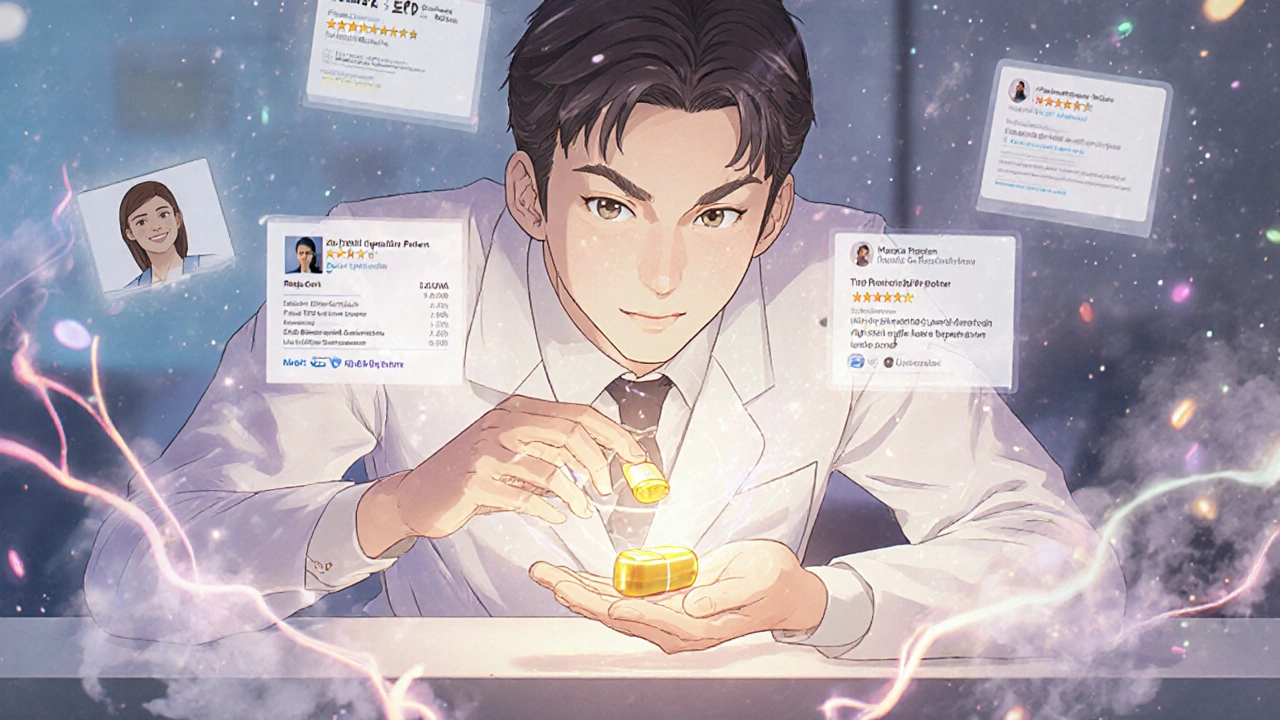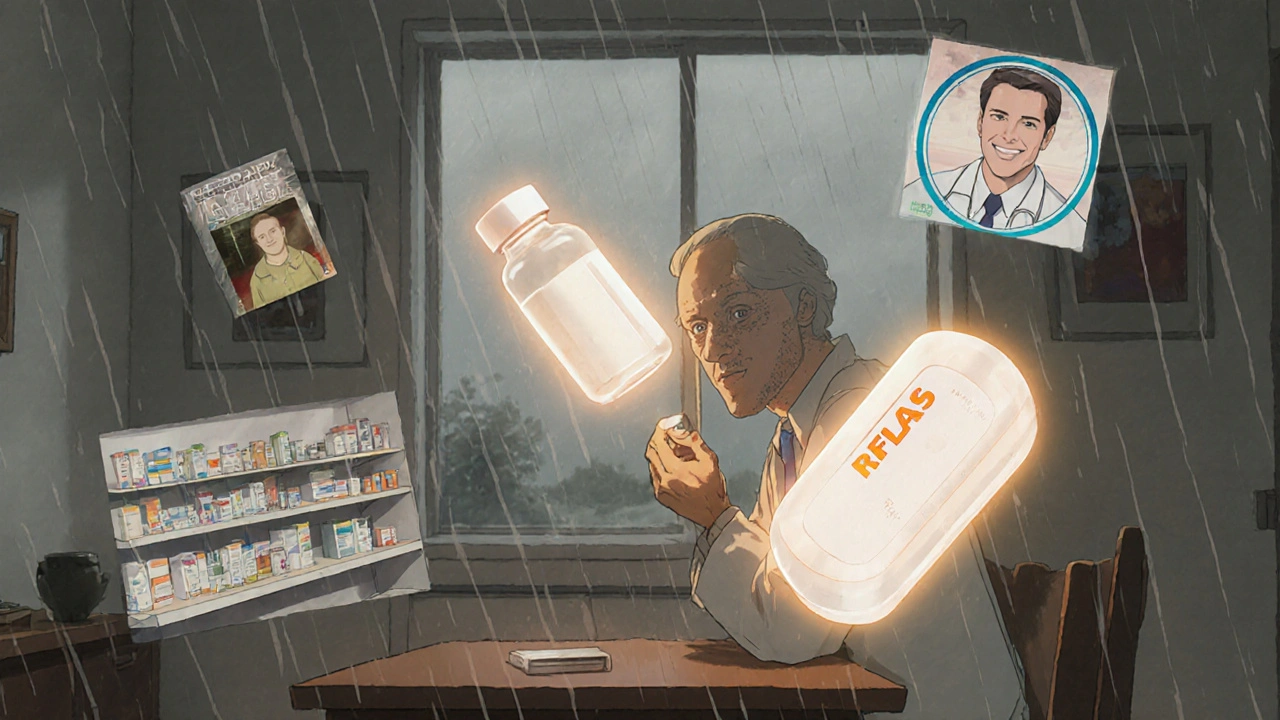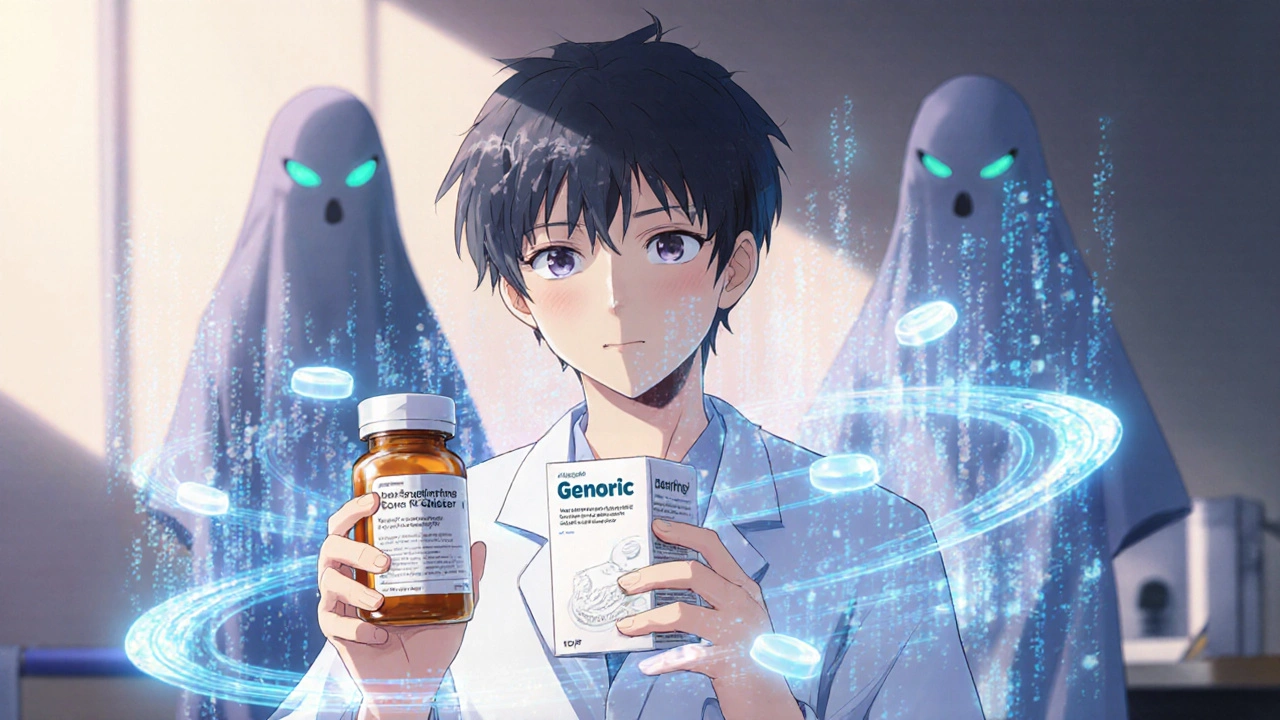When you pick up a prescription for a generic drug, you’re getting the same active ingredient as the brand-name version. The FDA says so. Your pharmacist says so. But if you’ve read online reviews from other patients who claim the generic didn’t work as well-or made them feel worse-you might start to wonder. Is it just in your head? Or is there something real behind those stories?
Why Do People Doubt Generic Drugs?
It’s not about science. It’s about perception. Generic drugs are required by law to match brand-name drugs in strength, dosage, and how the body absorbs them. The FDA’s bioequivalence standards demand that generics deliver 80% to 125% of the active ingredient’s effect compared to the original. That’s not a guess. That’s lab-tested, statistically proven. Yet, nearly one in three patients still believe generics are less effective. A 2015 review of 52 studies found that 35.6% of regular people thought generics were inferior. Only 23.6% of pharmacists felt the same. Doctors were in the middle. Why the gap? It’s because people don’t trust the system. They see the price difference-often 80% cheaper-and assume cheaper means lower quality. They notice the pill looks different: smaller, white instead of blue, no logo. They read comments like, “My generic Lyrica didn’t touch my pain,” or “I had worse side effects after switching.” Those stories stick.The Nocebo Effect: When Expectations Make You Sick
There’s a powerful psychological phenomenon called the nocebo effect-the opposite of placebo. If you expect something to hurt you, your body can make it happen. A 2018 study in the European Journal of Public Health showed this clearly. Patients were given the exact same tramadol (a painkiller), but half got it labeled as generic, half as brand-name. The group told it was generic reported 18.3% more pain, took 15.6% more extra pills, and stopped taking it 22.7% sooner. The drug was identical. The only difference was what they believed. This isn’t rare. Studies show patients who doubt generics report side effects 27.4% more often-even when the side effect profile is identical. Their minds are rewriting their experience.What Patients Are Saying Online
Look at Reddit, PatientsLikeMe, or Facebook groups. Over 6,000 posts between 2020 and 2023 mentioned generic medications. Nearly half (47.3%) talked about “different side effects.” Over a third (32.9%) said the drug “wasn’t working as well.” One Reddit user wrote in March 2023: “My doctor switched me to generic Lyrica and within two weeks my nerve pain returned-I’m convinced the generics aren’t made to the same standards.” But there’s another side. Over 1,400 posts shared positive experiences: “After 3 years on generic sertraline, I’ve saved $2,180 with zero difference.” “My blood pressure is better on the generic. My wallet thanks me.” The problem? Negative stories get louder. They’re emotional. They’re personal. They feel more real than a government report.Who Influences Patients the Most?
You’d think the FDA or a drug company ad would sway people. But research shows it’s your doctor or pharmacist. A 2024 study found that 69.8% of patients were more likely to accept a generic if their provider recommended it confidently. That’s a huge number. It means trust in the person giving you the pill matters more than the pill itself. When pharmacists take just 90 seconds to explain: “This is the same medicine, just cheaper. The FDA checks it just as hard,” patient acceptance jumps by 38.7%. In one trial, that simple conversation cut patient questions about generics by over half. But here’s the catch: most doctors have less than two minutes to talk about prescriptions. Pharmacists are rushed too. Time is the enemy of trust.
What Works: Real Solutions That Help
Some health systems are fixing this. Kaiser Permanente started handing out simple one-page sheets called “Generic Medication Facts.” They explain bioequivalence in plain language. No jargon. Just: “Same medicine. Same results. Lower cost.” After six months, patient inquiries dropped by 52%. Adherence went up by 18.6%. People started taking their meds longer because they stopped worrying. Other programs train pharmacists in motivational interviewing-asking open questions like, “What’s your biggest concern about switching?” instead of saying, “It’s fine.” That approach improves provider confidence by 63% after just four hours of training. Even the FDA is stepping up. In 2023, they launched a $15.7 million public education campaign: “Generics: Same Medicine, Lower Cost.” Early results show a 22.4% boost in consumer confidence.Why Age and Education Matter
Younger patients-those under 35-are far more accepting of generics. About 68% see them as equal to brand-name drugs. Older patients, especially over 65, are much more skeptical-only 42% trust them. Education level plays a big role too. People with higher education are more likely to understand how generics are approved. They’re also more likely to read the FDA’s website or ask questions instead of assuming the worst. This isn’t about intelligence. It’s about exposure. Younger people grew up with generics. They’ve seen them work. Older generations remember when generics were harder to find, less reliable, or marketed as “cheap alternatives.” That memory lingers.What About Authorized Generics?
Here’s an interesting twist: some brand-name companies now sell their own generic versions. These are called “authorized generics.” They’re made by the original manufacturer, just without the brand name or fancy packaging. They’re not cheaper than regular generics-but they’re often cheaper than the branded version. And patients trust them more. In 2023, authorized generic prescriptions grew 37.6% year-over-year. Why? Because they remove the “different company” fear. If your brand-name drug comes from the same factory, it’s easier to believe it’s the same.
The Real Cost of Distrust
This isn’t just about feelings. It’s about money and health. In the U.S., avoidable brand-name prescriptions and poor adherence to generics cost the system $14.3 billion a year. That’s billions in extra bills, ER visits, hospitalizations-all because someone didn’t trust a pill. Meanwhile, generics make up 90% of all prescriptions filled. But only 27% of patients say they’re completely confident in their effectiveness. That’s a massive gap between usage and belief.What You Can Do
If you’re switching to a generic:- Ask your pharmacist: “Is this the same as the brand? How do you know?”
- Check the FDA’s website for the drug’s bioequivalence data. It’s public.
- Give it time. Sometimes side effects fade after a week or two.
- If you feel worse, don’t assume it’s the generic. Talk to your doctor. It could be something else.
- Don’t say, “It’s fine.” Say, “This is the same medicine, approved by the FDA to work just like the brand. I’ve seen it work for hundreds of patients.”
- Use simple visuals. Show the 80-125% range. Explain what bioequivalence means in plain terms.
- Ask patients what they’ve heard. Then correct the myths gently.
Final Thought: Trust Is Built, Not Given
Generics aren’t a compromise. They’re a win-for your wallet, your health system, and your future. But trust doesn’t come from regulations. It comes from stories. From conversations. From seeing someone like you, who took the same pill, and stayed healthy. The next time you see a negative review, ask: Who wrote this? Did they talk to a pharmacist? Did they give it time? Or did they just assume the worst because it was cheaper? The truth is out there. You just have to look past the noise.Are generic drugs really the same as brand-name drugs?
Yes. By law, generics must contain the same active ingredient, strength, dosage form, and route of administration as the brand-name drug. The FDA requires them to be bioequivalent-meaning they work the same way in your body, with 90% confidence that their absorption falls within 80-125% of the brand’s levels. The only differences are in inactive ingredients, color, shape, or packaging-all of which have no effect on how the drug works.
Why do some people say generics don’t work as well?
It’s often the nocebo effect-when expecting a drug to be less effective leads to feeling worse. Studies show patients who believe they’re taking a generic report more side effects and lower effectiveness-even when the pill is identical to the brand. Online reviews amplify this, with emotional stories standing out more than data. Cost stigma also plays a role: people assume cheaper = worse quality.
Can switching to a generic cause new side effects?
It’s possible, but rare. Generic drugs must match the brand’s active ingredient exactly. However, they can use different inactive ingredients-like fillers or dyes-which might trigger allergies in sensitive individuals. If you notice new side effects after switching, talk to your doctor. It could be the filler, not the medicine itself. Never stop taking your medication without medical advice.
Are authorized generics better than regular generics?
Not in terms of effectiveness-they’re identical. But authorized generics are made by the original brand-name company, just without the brand name. Many patients trust them more because they know the same factory made them. They’re often priced between regular generics and brand-name drugs, offering a middle ground for those still unsure.
Why do pharmacists recommend generics?
Because they save patients money without sacrificing safety or effectiveness. Generics account for 90% of prescriptions filled in the U.S. Pharmacists see daily how switching to generics helps people afford their meds long-term. When they explain the science clearly, patient adherence improves by up to 38.7%. Their recommendation carries more weight than any ad or website.
Is it safe to switch between different generic brands?
Yes. All FDA-approved generics meet the same strict standards. Switching between different generic manufacturers is common and safe for most drugs. For narrow therapeutic index drugs (like warfarin or levothyroxine), doctors may prefer consistency, but even then, switching between approved generics is generally safe if monitored. Always tell your doctor if you notice changes after switching.
How can I find reliable information about my generic drug?
Go to the FDA’s website and search for your drug using the Drug@FDA database. It shows all approved versions, including generics, with their bioequivalence data. Avoid relying on forums or social media alone. Trusted sources like the FDA, NIH, or your pharmacist are your best tools for accurate information.


10 Comments
November 14, 2025 Rachel Wusowicz
Okay but have you ever seen the factory where they make generics?? I mean, I’ve read the FDA reports… but what if the lab that tests them is owned by the same pharma conglomerate that makes the brand? Who’s really auditing who?? I’m not saying it’s a conspiracy… but why does the generic Lyrica pill look like a child’s vitamin?? And why does it taste like chalk?? I’ve been on this for 3 years and my anxiety spiked the moment I switched… coincidence? I don’t think so.
November 16, 2025 Ankit Right-hand for this but 2 qty HK 21
USA thinks it’s the center of the world. In India, we’ve been using generics since the 80s. Your body is weak. Your mind is weak. You think a pill is magic? It’s chemistry. If you feel worse, maybe you’re just weak. Stop blaming the pill. Blame your genes. Blame your diet. Blame your laziness.
November 17, 2025 Oyejobi Olufemi
Let me dismantle this whole narrative with pure epistemological rigor. The nocebo effect? A bourgeois construct to pacify the masses. You think your mind is so powerful that it can manufacture pain out of thin air? Then why don’t you manifest a Lamborghini when you’re broke? Why don’t you cure cancer by thinking positively? The system is rigged. Generics are manufactured in substandard facilities under lax oversight. The FDA is a puppet. The price difference isn’t about efficiency-it’s about exploitation. You’re being gaslit by Big Pharma and their academic lapdogs.
November 18, 2025 Daniel Stewart
It’s fascinating how deeply embedded cultural narratives shape physiological perception. The symbolic weight of branding-its aesthetic, its history, its emotional resonance-creates a kind of pharmaco-symbolic hierarchy. When you remove the logo, you remove the ritual. The pill becomes an object, not a sacrament. And objects, devoid of myth, are easier to distrust. We don’t just take medicine. We perform healing.
November 19, 2025 Latrisha M.
I’ve been on generic sertraline for 5 years. Zero issues. My doctor explained the FDA standards. I checked the database. It’s the same molecule. If you’re having side effects, talk to your provider-but don’t assume it’s the generic. Give it time. Your mind matters, but so does science.
November 19, 2025 Dan Angles
It is imperative to recognize that the regulatory framework governing generic pharmaceuticals is among the most rigorously enforced in the global healthcare landscape. The bioequivalence thresholds established by the FDA are not arbitrary benchmarks; they are statistically validated, peer-reviewed, and continuously monitored through post-marketing surveillance. To attribute adverse outcomes to the pharmaceutical formulation, absent clinical evidence of bioinequivalence, is to conflate correlation with causation-a logical fallacy of significant clinical consequence.
November 20, 2025 Danish dan iwan Adventure
Generic bioequivalence = 80-125% AUC. That’s a 45% window. That’s not the same. That’s mathematically different. If your drug has a narrow therapeutic index, this isn’t just semantics-it’s risk. You’re gambling with your neurochemistry. Don’t be fooled by marketing. The FDA approves, but doesn’t guarantee. Read the fine print.
November 22, 2025 Jamie Watts
Bro I switched to generic metoprolol last year and my heart felt like it was gonna explode. I thought I was dying. Turned out I was just anxious because the pill was white and tiny. I went back to brand and felt fine. So yeah maybe it’s all in my head but my head is real and it’s screaming. Don’t tell me to get over it. I’ve been on this med for 10 years and I’m not a lab rat
November 23, 2025 John Mwalwala
Okay but here’s the thing nobody’s talking about-the fillers. The dyes. The binders. The generics use different inactive ingredients. I have a corn allergy. My brand-name pill had potato starch. The generic had cornstarch. I broke out in hives. It wasn’t the active ingredient. It was the filler. The FDA doesn’t require them to disclose all inactive ingredients in plain language. So yeah, I’m paranoid. And I’m right.
November 24, 2025 Deepak Mishra
OMG I just had the WORST experience with generic gabapentin!! I cried for 3 days straight!! My dog looked at me like I was a ghost!! I thought I was going to die!! But then I switched back to the brand and I felt like a new person!! 🥹💖 The difference is REAL!! Why won’t anyone listen to me?? I’m not crazy!! I just want to feel normal again!! 😭
Write a comment